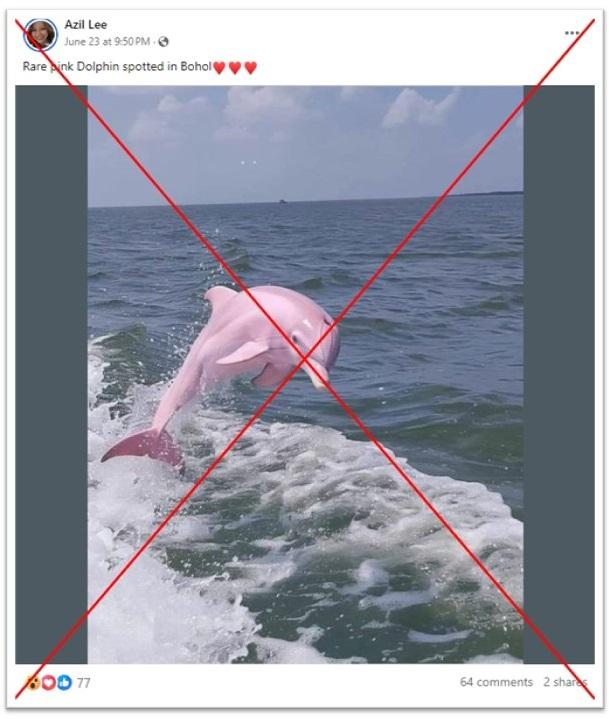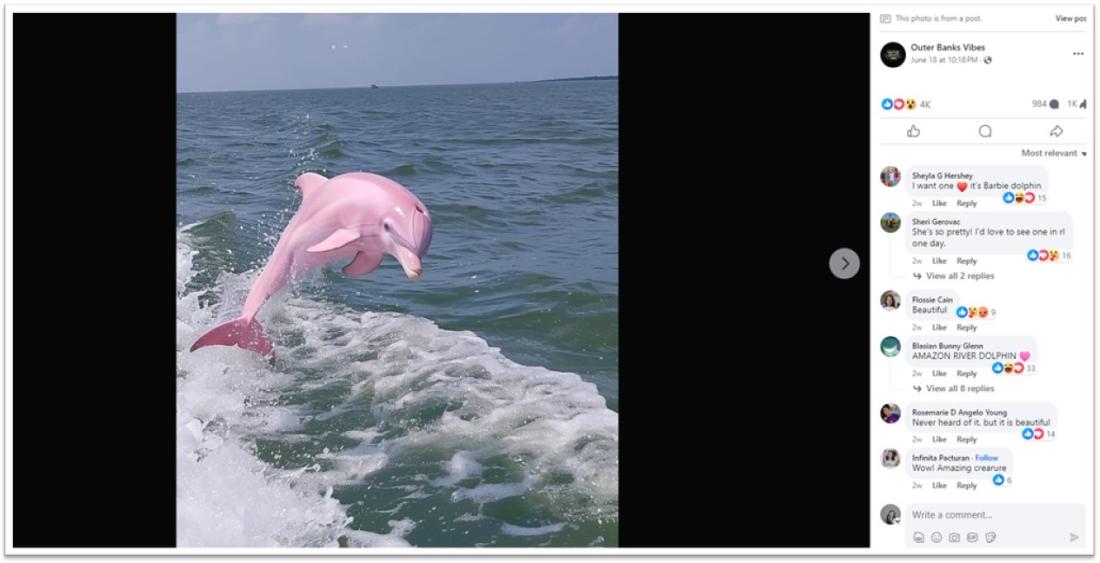
Facebook users fall for AI-generated image of 'pink dolphin'
- This article is more than one year old.
- Published on July 8, 2024 at 09:13
- 2 min read
- By Ara Eugenio, AFP Philippines
"Rare pink Dolphin spotted in Bohol," read a Facebook post that shared the image on June 23, 2024, referring to an island province in the central Philippines.
The picture appears to show a pink-coloured dolphin leaping out of the water.
Similar Facebook posts in the Philippines shared the image but claimed the creature was spotted in the US state of North Carolina.

The picture garnered more than 3,000 shares on Facebook in the Philippines, including in posts here, here, here and here. It also spread in posts in Korean, Thai, Malay and Sinhala.
Some Facebook users appeared to believe the picture was genuine.
"Wow this is so cute," one commented.
"This is awesome. Are they friendly with humans," another wrote.
But reverse image searches on Google found the image was first shared in a Facebook post that clarified it was not a real photo.
The "Outer Banks Vibes" Facebook page posted on June 18, 2024 that the creature was spotted off the coast of North Carolina (archived link).
However, the post -- shared more than 74,000 times -- was later updated to indicate that the image was "created with AI".

The Facebook page posted similar pictures depicting a "distressed dolphin" purportedly washed up on a North Carolina beach that it also said were AI-generated (archived link)
'Unrealistic'
Marine authorities said there were no recorded sightings of the rare mammal in either Bohol or North Carolina.
"No pink dolphins have been spotted in Bohol," Johann Tejada, a marine biologist at the Philippines' Bureau of Fisheries and Aquatic Resources, told AFP.
Tejada said the image circulating on Facebook was "obviously edited or manipulated" and did not "realistically portray a pink dolphin."
A spokeswoman for the North Carolina Division of Marine Fisheries spokesperson told AFP: "There have been no verified sightings of pink dolphins in North Carolina waters."
There are two species of pink dolphin -- the Amazon River dolphin and the Indo-Pacific humpback dolphin -- which are both endangered, according to UK-based charity Whale and Dolphin Conservation (archived link).
The Amazon River dolphin, which inhabits the South American rainforest's waterways, has a distinctive long snout and turns pink or pinkish-grey as it ages (archived link).
The Indo-Pacific humpback dolphin -- found in mainland China, Taiwan and Hong Kong -- ranges from a grey colour to white or pale pink (archived link).

AA Yaptinchay, director of Marine Wildlife Watch Philippines, said the claim was "fake" as the dolphin in the picture did not realistically depict either species.
"The animal in the picture is probably an albino bottlenose dolphin enhanced to be more pink than it should be, instead of white," he told AFP.
AFP has repeatedly debunked social media posts passing off AI-generated images of animals as genuine, including a giant octopus and a tree-climbing elephant.
Copyright © AFP 2017-2026. Any commercial use of this content requires a subscription. Click here to find out more.
Is there content that you would like AFP to fact-check? Get in touch.
Contact us




